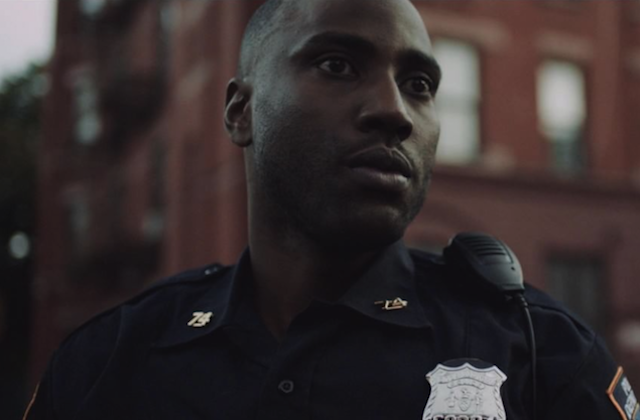Audiences who watch "Monsters and Men" are greeted with a disturbingly familiar scenario: a Latinx man (Anthony Ramos, "She’s Gotta Have It") films a New York Police Department (NYPD) officer as he kills an unarmed Black man selling cigarettes outside a Brooklyn store.
"Monsters and Men" director and writer Reinaldo Marcus Green previously tackled police violence against Black and Brown New Yorkers in "Stop," a short film about a Black child caught up in stop-and-frisk policing. The Black and Latinx filmmaker says that "Monsters and Men," his first feature narrative film, grew out of a conversation with a friend in law enforcement about Daniel Pantaleo, the NYPD officer who killed Eric Garner for selling cigarettes.
"Two o’clock in the morning, we’re eating pizza, and we start talking about the Eric Garner case," Green tells Colorlines. "We both start talking about the video tape, and what started as a regular conversation between two friends turned into a pretty heated discussion. I saw a guy that should still be alive, but my friend said, ‘Ray, it’s unfortunate, but it does look like he was resisting arrest.’ It shocked me because all I could see were the facts in my head. But it looks totally different to a police officer."
rn
The conversation planted a seed in Green’s mind that grew into a film that explores police violence from the perspectives of three people: Manny, the Latinx man who considers releasing the video despite opposition from his worried family and the killer cop’s intimidating colleagues; Zee (Kelvin Harrison Jr., "Monster"), a Black teenager who risks a potentially lucrative baseball career to protest the violence; and Dennis (John David Washington, "Ballers"), a Black NYPD officer torn between protecting his co-worker and the knowledge that he could have been the slain man.
Washington tells Colorlines that he researched the role by speaking with beat cops and detectives about their jobs. The actor, like his director, says he saw power in featuring a policeman’s perspective—despite criticism that humanizing police officers could minimize the impact of their oppressive power over Black and Brown citizens.
"I was the person, before I met these officers, that had these tough questions [about police brutality]. ‘Is it the training? Why does this keep happening?’" Washington says. "And I got those answers. If it wasn’t for this film, maybe I wouldn’t have."
Washington recounts several conversations with officers who condemned colleagues who commit acts of violence under color of authority. "It was a relief to hear their passion behind why [these actions are] a problem," he says. "I don’t know if the masses know this, or if there’s a platform where police officers—especially ones that look like me—are telling people this information."
Green frames the film’s story as part of a bigger picture of police violence in the United States. For instance, Manny’s narrative highlights the retribution that people like Ramsey Orta, who filmed Pantaleo choking Garner to death, face for leaking videos of misconduct.
"I started going down this train of, ‘Where are the guys that videotaped this [violence]?’" Green explains. "Some of them are in prison, some got arrested—it was crazy. The conversation around policing, with body cameras etc., changed because of people videotaping."
He also connects Zee’s plotline to his past as a high school athlete. As for the conflict Zee feels between his sports opportunities and the need to speak out, Green asked himself a specific question: “What would Colin Kaepernick do if he were 17?"
rnt
"Kelvin Harrison Jr. is a star!" says the @HuffPost. MONSTERS AND MEN in theaters September 28. pic.twitter.com/8YUSj8FHPs
rnt— MONSTERS AND MEN (@monstersmenfilm) September 11, 2018
rntGreen ultimately hopes that "Monsters and Men" will inspire kids like Zee to realize their power. "It’s a simple proposition: that your voice matters, no matter how small or insignificant you think it is," he explains. "If we pull together collectively, and make enough noise, people will hear us."
"Monsters and Men" debuts in theaters today (September 28).
